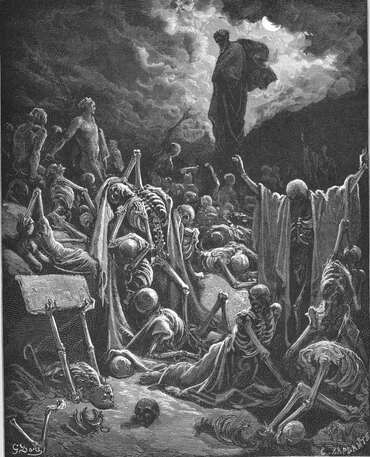1
Aleph. How is the gold become dim, the finest colour is changed, the stones of the sanctuary are scattered in the top of every street?
2
Beth. The noble sons of Sion, and they that were clothed with the best gold: how are they esteemed as earthen vessels, the work of the potter's hands?
3
Ghimel. Even the sea monsters have drawn out the breast, they have given suck to their young: the daughter of my people is cruel, like the ostrich in the desert.
4
Daleth. The tongue of the sucking child hath stuck to the roof of his mouth for thirst: the little ones have asked for bread, and there was none to break it unto them.
5
He. They that were fed delicately have died in the streets; they that were brought up in scarlet have embraced the dung.
6
Vau. And the iniquity of the daughter of my people is made greater than the sin of Sodom, which was overthrown in a moment, and hands took nothing in her.
7
Zain. Her Nazarites were whiter than snow, purer than milk, more ruddy than the old ivory, fairer than the sapphire.
8
Heth. Their face is now made blacker than coals, and they are not known in the streets: their skin hath stuck to their bones, it is withered, and is become like wood.
9
Teth. It was better with them that were slain by the sword, than with them that died with hunger: for these pined away being consumed for want of the fruits of the earth.
10
Jod. The hands of the pitiful women have sodden their own children: they were their meat in the destruction of the daughter of my people.
11
Caph. The Lord hath accomplished his wrath, he hath poured out his fierce anger: and he hath kindled a fire in Sion, and it hath devoured the foundations thereof.
12
Lamed. The kings of the earth, and all the inhabitants of the world would not have believed, that the adversary and the enemy should enter in by the gates of Jerusalem.
13
Mem. For the sins of her prophets, and the iniquities of her priests, that have shed the blood of the just in the midst of her.
14
Nun. They have wandered as blind men in the streets, they were defiled with blood: and when they could not help walking in it, they held up their skirts.
15
Samech. Depart you that are defiled, they cried out to them: Depart, get ye hence, touch not: for they quarrelled, and being removed, they said among the Gentiles: He will no more dwell among them.
16
Phe. The face of the Lord hath divided them, he will no more regard them: they respected not the persons of the priests, neither had they pity on the ancient.
17
Ain. While we were yet standing, our eyes failed, expecting help for us in vain, when we looked attentively towards a nation that was not able to save.
18
Sade. Our steps have slipped in the way of our streets, our end draweth near: our days are fulfilled, for our end is come.
19
Coph. Our persecutors were swifter than the eagles of the air: they pursued us upon the mountains, they lay in wait for us in the wilderness.
20
Res. The breath of our mouth, Christ the Lord, is taken in our sins: to whom we said: Under thy shadow we shall live among the Gentiles.
21
Sin. Rejoice, and be glad, O daughter of Edom, that dwellest in the land of Hus: to thee also shall the cup come, thou shalt be made drunk, and naked.
22
Thau. Thy iniquity is accomplished, O daughter of Sion, he will no more carry thee away into captivity: he visited thy iniquity, O daughter of Edom, he hath discovered thy sins. The Prayer of Jeremias the Prophet.







